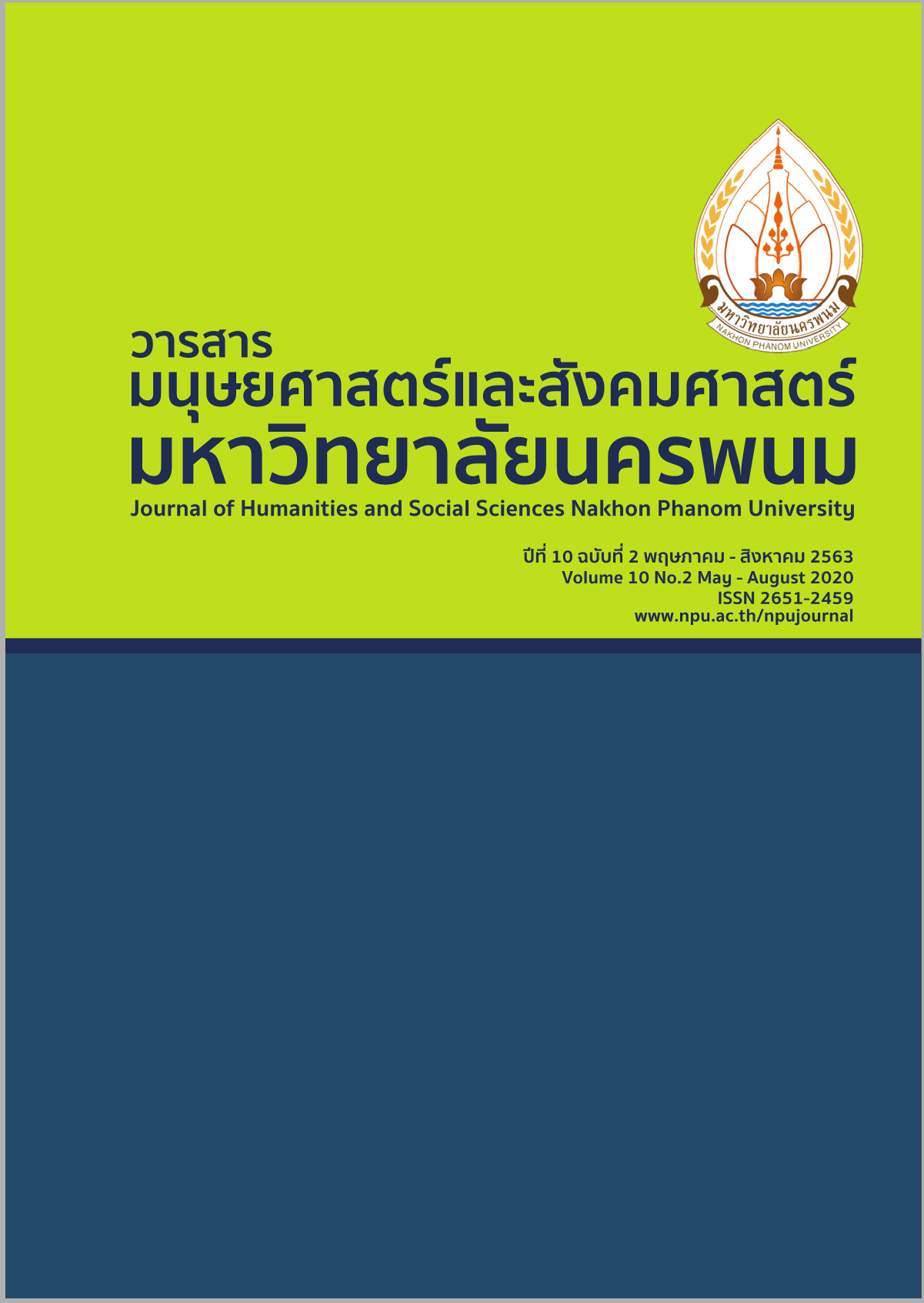The Development of Learning Activities Using STAD Cooperative Learning Model Focusing on Problem Solving and Mathematical Connections Skills on Linear Equation with One Variable for Mathayomsuksa 1
Main Article Content
Abstract
This research aimed 1) to develop lesson plan using STAD cooperative learning model focusing on mathematics problem solving skill and mathematical connection skill and lesson plan using the traditional teaching methods on a linear equation in one variable of mathayomsuksa 1 students to have the efficiency criteria of 75/75 2) to fine the effectiveness index value of lesson plan 3) to compare the learning achievement between the group using STAD cooperative learning model and the group using the traditional teaching methods 4) to compare ability on problem solving and ability on mathematical connection between the group using STAD cooperative learning model and the group using the traditional teaching methods The sample groups used in this research were 80 students of mathayomsuksa 1, Lamplaimat School, Burirum province have 2 class by cluster random sampling. Include the class using STAD cooperative learning model focusing on Mathematics problem solving skill and mathematics connection skill and the class using the traditional teaching methods The tools used were lesson plan using STAD and lesson plan using the traditional teaching methods 2) Learning achievement test The confidence value is 0.99 3) ability on problem solving and ability on mathematics connection test The confidence value is 0.80
The results of the study were as follows 1) Lesson plan using STAD cooperative learning model focusing on mathematics problem solving skill and mathematical connection skill on a linear equation in one variable to have the efficiency 82.70/81.87 and lesson plan using the traditional teaching methods on A linear Equation in One Variable to have the efficiency 80.60/76.60, which was higher than the required criteria. 2) Lesson plan using STAD cooperative Learning have the effectiveness index value of learning was 0.6284 and lesson plan using the traditional teaching methods have the effectiveness index value of learning was 0.5237 3) student the group using STAD cooperative learning model have learning achievement higher than the group using the traditional teaching methods. They were statistically different significant at .05 level. 4) student the group using STAD cooperative learning model have ability on problem solving and ability on mathematics connection higher than The group using the traditional teaching methods They were statistically different significant at .05 level.
Article Details
References
theknik STAD rư̄ang samakān chœ̄ng sēn tūaprǣ dīeo klum sāra kān rīanrū khanittasāt chan
matthayommasưksā pī thī nưng [Development of learning activities By using cooperative learning
methods based on STAD technique on linear equations one variable Group learning mathematics
Mathayomsuksa 1(Unpublished master thesis)], Rajabhatmahasarakham University, Mahasarakham,
Thailand.
2. Khamhongsa, S. (2013). kānprīapthīap phon samrit thāngkān rīan rư̄ang samakān chœ̄ng sēn tūaprǣ dīeo
khō̜ng nakrīan chan matthayommasưksā pī thī nưng rawāng kānčhatkān rīanrū bǣp rūammư̄ bǣp
STAD kap kānčhatkān rīanrū bǣp pakati [Comparison of learning achievement Subject Linear
equation with one variable of mathayomsuksa 1 students between STAD cooperative learning
management and management Learn normally (Unpublished master thesis)]. Mahasarakrm
University, Mahasarakham, Thailand.
3. Manhkhang, S. (2012). kānphatthanā chut kitčhakam kān rīanrū rư̄ang samakān chœ̄ng sēn tūaprǣ dīeo
dōi chai rūpbǣp kān rīanrū bǣp rūammư̄ theknik STAD samrap nakrīan chan matthayommasưksā
pī thī nưng [Development of a set of learning activities on linear equations, one variable using
Cooperative learning model STAD technique for Mathayomsuksa 11 (Unpublished master thesis)].
Burapa university, Chonburi, Thailand.
4. Ministry of Education. (2008). laksūt kǣn klāng kānsưksā naphư̄n thān Phutthasakkarāt
sō̜ngphanhārō̜ihāsipʻet [Basic Education Core Curriculum 2008]. Ministry of Education, Bangkok,
Thailand.
5. Phuinuan, S. (2007). kānphatthanā rūpbǣp kānsō̜n bǣp rūammư̄ kan rīanrū bǣp STAD læ phon samrit
thāngkān rīan klum sāra kān rīanrū khanittasāt rư̄ang čhōt panhā kān būak læ kān lop
čhamnūannap thī mī phonlap læ tūatang mai kœ̄n 100,000 khō̜ng nakrīan chan prathomsưksā pī
thī sām [Development of a co-teaching model for STAD learning and academic achievement
Learning mathematics strands on the problem of adding and subtracting numbers with results and
Not more than 100,000 students in grade 3 (Unpublished master thesis)]. Khonkaen University,
Khonkaen, Thailand.
6. Prathumchat, T. (2005). kānphatthanā phǣnkān čhatkān rīanrū wichā khanittasāt rư̄ang kān prayuk khō̜ng
samakān chœ̄ng sēn tūaprǣ dīeo khan matthayommasưksā pī thī sō̜ng [Development of learning
management plans Mathematics The application of Linear equations, one variable
Mathayomsuksa 2 (Unpublished master thesis)]. Mahasarakham University, Mahasarakham,
Thailand.
7. Ruamchit, S. (2545). kānphatthanā kitčhakam kānsō̜n kǣ čhōt panhā khanittasāt chan prathomsưksā pī thī
hok dōi chai rūpbǣp kānsō̜n bǣp rūammư̄ kan rīanrū”. [Development of mathematics problem
solving activities Grade 6 By using cooperative learning styles to learn (Unpublished master
thesis)]. Khonkaen University, Khonkaen, Thailand.
8. Ruangkasem, K. (2004). kānphatthanā kitčhakam kān rīanrū rư̄ang set klum sāra kān rīanrū khanittasāt chan
matthayommasưksā pī thī sī dōi kān rīan bǣp bǣng klum tām sangkat samrit phon thāngkān rīan
( STAD ) [Development of learning activities on set Group learning mathematics Mathayomsuksa 4
by grouping according to learning achievement (STAD) (Unpublished master thesis). Master of
Education Program in Curriculum and Instruction, Mahasarakham University, Mahasarakham, Thailand.
9. Slavin R.E. (1995). Cooperative Learning. Theory, Research and Practice. 2nd ed. National Council of
Teachers of Mathematics. (1989). Curriculum and Evaluation Standards for School Mathematics
From ; http://www.nctm.org/about/related.htm.


